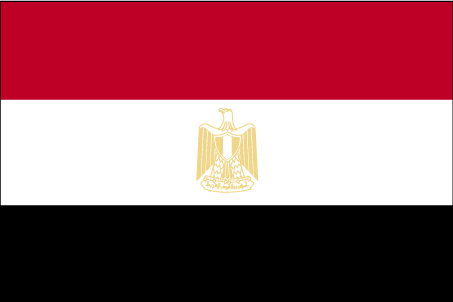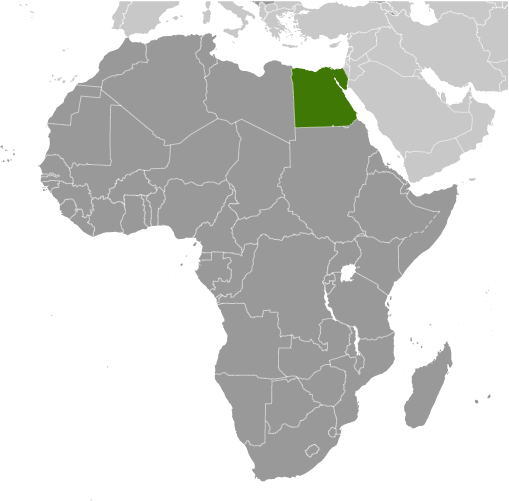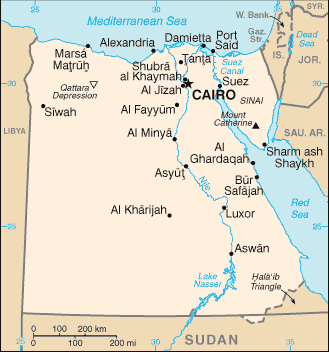The regularity and richness of the annual Nile River flood, coupled with semi-isolation provided by deserts to the east and west, allowed for the development of one of the world's great civilizations. A unified kingdom arose circa 3200 B.C., and a series of dynasties ruled in Egypt for the next three millennia. The last native dynasty fell to the Persians in 341 B.C., who in turn were replaced by the Greeks, Romans, and Byzantines. It was the Arabs who introduced Islam and the Arabic language in the 7th century and who ruled for the next six centuries. A local military caste, the Mamluks took control about 1250 and continued to govern after the conquest of Egypt by the Ottoman Turks in 1517. Following the completion of the Suez Canal in 1869, Egypt became an important world transportation hub, but also fell heavily into debt. Ostensibly to protect its investments, Britain seized control of Egypt's government in 1882, but nominal allegiance to the Ottoman Empire continued until 1914. Partially independent from the UK in 1922, Egypt acquired full sovereignty with the overthrow of the British-backed monarchy in 1952. The completion of the Aswan High Dam in 1971 and the resultant Lake Nasser have altered the time-honored place of the Nile River in the agriculture and ecology of Egypt. A rapidly growing population (the largest in the Arab world), limited arable land, and dependence on the Nile all continue to overtax resources and stress society. The government has struggled to meet the demands of Egypt's growing population through economic reform and massive investment in communications and physical infrastructure.
Country Name
Conventional long form:Arab Republic of Egypt
Conventional short form:Egypt
Local long form:Jumhuriyat Misr al-Arabiyah
Local short form:Misr
Former:United Arab Republic (with Syria)
Government Type
republic
Capital
Name: Cairo
Geographic coordinates:30 03 N, 31 15 E
Time difference:UTC+2 (7 hours ahead of Washington, DC during Standard Time)
daylight saving time: +1hr, begins last Friday in April; ends first Friday in August
Administrative divisions
29 governorates (muhafazat, singular - muhafazat); Ad Daqahliyah, Al Bahr al Ahmar (Red Sea), Al Buhayrah (El Beheira), Al Fayyum (El Faiyum), Al Gharbiyah, Al Iskandariyah (Alexandria), Al Isma'iliyah (Ismailia), Al Jizah (Giza), Al Minufiyah (El Monofia), Al Minya, Al Qahirah (Cairo), Al Qalyubiyah, Al Uqsur, Al Wadi al Jadid (New Valley), As Suways (Suez), Ash Sharqiyah, Aswan, Asyut, Bani Suwayf (Beni Suef), Bur Sa'id (Port Said), Dumyat (Damietta), Helwan, Janub Sina' (South Sinai), Kafr ash Shaykh, Matruh (Western Desert), Qina (Qena), Shamal Sina' (North Sinai), Sittah Uktubar, Suhaj (Sohag)
Independence
28 February 1922 (from the UK)
National Holiday
Revolution Day, 23 July (1952)
Constitution
11 September 1971; amended 22 May 1980, 25 May 2005, and 26 March 2007
Legal system
based on Islamic and civil law (particularly Napoleonic codes); judicial review by Supreme Court and Council of State (oversees validity of administrative decisions); accepts compulsory ICJ jurisdiction with reservations
Suffrage
18 years of age; universal and compulsory
Executive branch
Chief of state:President Mohamed Hosni MUBARAK (since 14 October 1981)
Head of government:Prime Minister Ahmed Mohamed NAZIF (since 9 July 2004)
Cabinet:Cabinet appointed by the president
(For more information visit the World Leaders website)
Elections:president elected by popular vote for a six-year term (no term limits); note - a national referendum in May 2005 approved a constitutional amendment that changed the presidential election to a multicandidate popular vote; previously the president was nominated by the People's Assembly and the nomination was validated by a national, popular referendum; last referendum held on 26 September 1999; first election under terms of the constitutional amendment held on 7 September 2005 (next scheduled for 2011)
Election results: Hosni MUBARAK reelected president; percent of vote - Hosni MUBARAK 88.6%, Ayman NOUR 7.6%, Noman GOMAA 2.9%
Legislative branch
bicameral system consists of the Advisory Council or Majlis al-Shura (Shura Council) that traditionally functions only in a consultative role (264 seats; 176 members elected by popular vote, 88 appointed by the president; members serve six-year terms; mid-term elections for half of the elected members) and the People's Assembly or Majlis al-Sha'b (454 seats; 444 members elected by popular vote, 10 appointed by the president; members serve five-year terms)
Elections: Advisory Council - last held on June 2007 (next to be held in May-June 2010); People's Assembly - three-phase voting - last held on 7 and 20 November, 1 December 2005; (next to be held in November-December 2010)
Election results:Advisory Council - percent of vote by party - NA; seats by party - NDP 84, Tagammu 1, independents 3; People's Assembly - percent of vote by party - NA; seats by party - NDP 311, NWP 6, Tagammu 2, Tomorrow Party 1, independents 112 (12 seats to be determined by rerun elections, 10 seats appointed by President)
Judicial branch
Supreme Constitutional Court
Political Parties and Leaders
Democratic Front Party [Osama Al Ghazali HARB]; Nasserist Party [Diaa El-Din DAWOUD]; National Democratic Party or NDP (governing party) [Mohamed Hosni MUBARAK]; National Progressive Unionist Grouping or Tagammu [Rifaat EL-SAID]; New Wafd Party or NWP [Mahmoud ABAZA]; Tomorrow Party
note: formation of political parties must be approved by the government; only parties with representation in elected bodies are listed
Political pressure groups and leaders
Muslim Brotherhood (technically illegal)
note: despite a constitutional ban against religious-based parties and political activity, the technically illegal Muslim Brotherhood constitutes Egypt's most potentially significant political opposition; MUBARAK has alternated between tolerating limited political activity by the Brotherhood (its members, who ran as independents, hold 88 seats in the People's Assembly) and blocking its influence; civic society groups are sanctioned, but constrained in practical terms; only trade unions and professional associations affiliated with the government are officially sanctioned; Internet social networking groups and bloggers
International organization participation
ABEDA, ACCT, AfDB, AFESD, AMF, AU, BSEC (observer), CAEU, CICA, COMESA, D-8, EBRD, FAO, G-15, G-24, G-77, IAEA, IBRD, ICAO, ICC, ICCt (signatory), ICRM, IDA, IDB, IFAD, IFC, IFRCS, IHO, ILO, IMF, IMO, IMSO, Interpol, IOC, IOM, IPU, ISO, ITSO, ITU, LAS, MIGA, MINURCAT, MINURSO, MONUC, NAM, OAPEC, OAS (observer), OIC, OIF, OSCE (partner), PCA, UN, UNAMID, UNCTAD, UNESCO, UNHCR, UNIDO, UNMIL, UNMIS, UNOCI, UNRWA, UNWTO, UPU, WCO, WFTU, WHO, WIPO, WMO, WTO
Diplomatic representation in the US
Chief of mission:Ambassador Sameh Hassan SHOUKRY
Chancery:3521 International Court NW, Washington, DC 20008
Telephone:[1] (202) 895-5400
FAX:[1] (202) 244-4319
Consulate(s) general:Chicago, Houston, New York, San Francisco
Diplomatic representation from the US
Chief of mission:Ambassador Margaret SCOBEY
Embassy:8 Kamal El Din Salah St., Garden City, Cairo
Mailing address:Unit 64900, Box 15, APO AE 09839-4900; 5 Tawfik Diab Street, Garden City, Cairo
Telephone:[20] (2) 2797-3300
FAX:[20] (2) 2797-3200
Flag description
three equal horizontal bands of red (top), white, and black; the national emblem (a gold Eagle of Saladin facing the hoist side with a shield superimposed on its chest above a scroll bearing the name of the country in Arabic) centered in the white band; colors derived from the Arab Liberation flag
note: similar to the flag of Syria, which has two green stars in the white band, Iraq, which has an Arabic inscription centered in the white band, and Yemen, which has a plain white band










